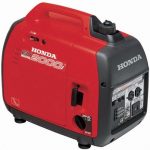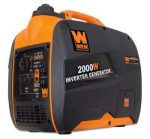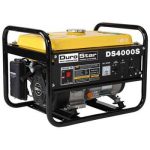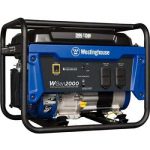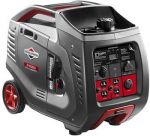Solar panels are great for your RV, but what when the weather is bad for days?
A good portable generator will help, even with the tough tasks, especially when you are miles away from a recharging station.
I selected the best portable generators.
Check the list and the buying to learn more about these machines that can improve your RV trips.
Champion 3500
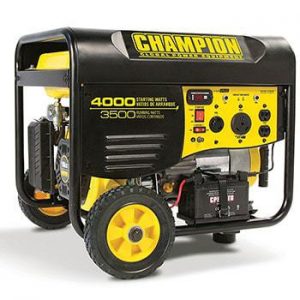
This Champion portable generator weighs 140 pounds and has 15.000 BTUs which is pretty impressive.
However, what brought it to the winning position is the runtime.
The device can work up to 12 hours!
It uses 3.8 gallons of gasoline for a full run and requires 0.6 oil.
The surge protection is built-in.
The outlets available with this Champion generators are 120V 30A RV, a locking outlet, and two 20A outlets for other small appliances.
The three-way electric ignition ensures an easy start every time you need it.
Pros
- 12 hours runtime
- Extended warranty
- Easy start
- Wheels make it easy to move
Cons
- No eco-mode
- Loud
 Dylan's Take
Dylan's TakeWith the runtime and extended, 3-year warranty, this Champion generator is just perfect for your RV.
It is CARB-compliant, EPA-certified, which means that you will be safe to use in many states.
Honda EU2000I
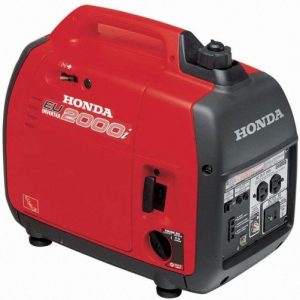
Honda is a safe bet for portable generators.
This model makes 2000 wats and is very lightweight with only 46 pounds.
I also like how quiet it is.
It can work up to 8 hours on a single gallon of gasoline.
Additionally, the Honda generator includes a low-oil indicator so you can prevent engine damage.
Despite the nickname Eco-Throttle, this Honda generator doesn’t support eco-friendly mode.
Pros
- Portable
- Energy efficient
- Lightweight
Cons
- 2000 watts isn’t suitable for tougher tasks
 Dylan's Take
Dylan's TakeMy favorite thing about this Honda generator is fuel efficiency.
Five-gallon gas can give you forty hours of use!
Wen Super Quiet 2000
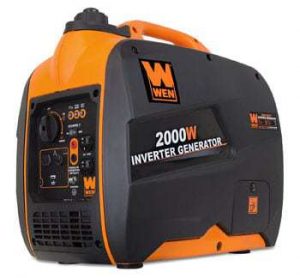
This Wen generator is easy to use, small and quiet.
It also has some excellent features, usually seen in many expensive models.
The device has eco-mode and offers you 12 hours of runtime while giving out 10.000 BTUs of AC/heating power.
It has three 120V outlets and a 5V USB port.
The low-oil indicator is a practical touch, that prevents damage and overload of the system.
Also, the design is convenient, and the generator has a carrying handle.
Pros
- Excellent performance with inverter
- Easy to use
- Indicator lights
Cons
- Medium power
 Dylan's Take
Dylan's TakeYou can get two of these small generators and connect them to improve the power.
When working on its own, the Wen generator is reliable, quiet and great for small appliances.
Durostar Portable Generator
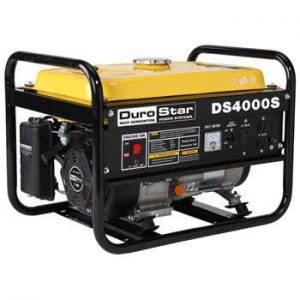
The Durostar portable generator isn’t CARB-backed, but it is a great machine all things considered.
It weighs under 100 pounds and has a four-gallon tank.
The device can provide eight hours of runtime when working on 50% capacity and delivering 4000 watts of running power.
The starting power is 4000 watts.
The generator has a sturdy steel frame, which protects it against damage.
It is a bit louder than the average vacuum cleaner and has several outlets.
Pros
- Excellent for heating and cooling systems
- Great value for the money
Cons
- Not very energy-efficient
 Dylan's Take
Dylan's TakeThe Durostar generator is durable and comes with a 1-year warranty.
It is great for people who like to go solo on their RV trips.
Westinghouse WH7500E
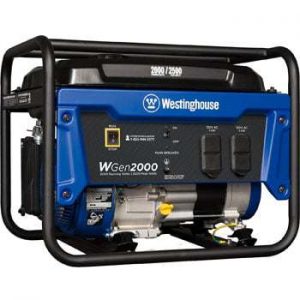
The Westinghouse is a market leader in the generator category.
This model is powerful and efficient, suitable for family RV trips.
It will give you 11 hours of runtime when working on 25% load capacity.
Surprisingly, this generator isn’t very noisy, most of the noise is mechanical.
The device is compatible with Westinghouse Transfer Switch and includes four 120V AC outlets.
The generator is reliable and easy to use.
Pros
- 20 hours of runtime
- Low oil shutdown safety feature
Cons
- A bit bulky
 Dylan's Take
Dylan's TakeThe Westinghouse generator is easy to use with a push-button operation.
It comes with an electric ignition battery, as an additional plus.
Briggs & Stratton 30545
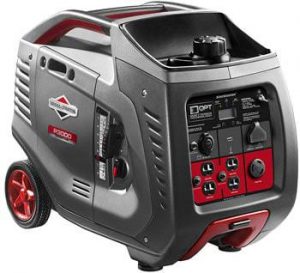
This little guy Briggs & Stratton generator is quiet but powerful.
It can give you enough power to light the RV, use a heater or air conditioner.
Also, the design is practical with an H-style handle, so you won’t have trouble moving it from one place to the other.
Despite excellent runtime and decent fuel efficiency, the generator has one drawback.
It isn’t CARB-backed, but it is EPA-certified.
Pros
- Has wheels
- Quiet
- Reliable
- Supports eco-mode
Cons
- Isn’t CARB-backed
- Coil problems
 Dylan's Take
Dylan's TakeThe Briggs & Stratton generator is small but great solo RV trips.
It isn’t overly noisy, and it is highly portable.
Buying Guide
The power of your generator determines the number of tasks you can use it for, such as camping, worksites, RV, and home-backup.
Let’s go through the most important things to consider when buying a portable generator for your motorhome.
Wattage
You need a generator to run appliances.
The number of watts a generator produces is an essential factor that tells you almost everything you need to know about the machine.
Peak power is the start-up wattage, and it is a momentary power boost that turns the appliance’s motor and running wattage on.
Therefore, determine what you will use the generator for and how much wattage an appliance needs.
Make sure to choose the one that can support your appliances.
Fuel
Portable generators are available on propane, gas, diesel, batteries or solar power.
Your available resources are the way to choose the fuel type.
Let’s go briefly through each fuel, so you can choose the best one for you.
Gas
Gas is used to power strong machines that support all household appliances.
They are loud and expensive.
A gasoline-powered generator also needs a fuel stabilizer to prevent potential damage, especially after being dormant for months.
Diesel
Diesel is more efficient and brings more energy than gas, but it is expensive.
Diesel engines require regular maintenance to work properly.
Propane
Propane is the best option for rural trips when there aren’t gas stations nearby.
Propane is stable, but it has less power than the same quantity of gasoline or diesel.
It is also quieter.
Battery
Battery-operated portable generators are low-power models with a maximum of 1800 watts.
They are quiet, cheap and don’t have emissions.
Battery-powered generators are best suited for recreational use.
Solar
Solar energy is a clean source, without fumes.
Generators that run on solar power are less powerful and only suitable for minor tasks.
Fuel Tank
The tank capacity plays a vital role when you go on long trips.
A bigger tank means more energy and longer working time.
The majority of models can work up to 7 or 9 hours at 50% load.
But, the larger the generator, the heavier it is and the more space it requires for storage.
Number of Outlets
A number of outlets are something people tend to neglect when looking for a portable generator.
It tells you how many appliances a generator supports at a time.
For example, a portable inverter generator has a minimum of two AC and one DC output.
Make sure your generator has a dedicated USB port, so you can use it to charge your electronics.
Start-Up Option
Portable generators start either by pull-type or have an easy electric start.
Electric start engine is easy to use and reliable, but more expensive.
Circuit Protector
A circuit protector is an essential thing to look for because it will protect your electronics from damage if a generator has a faulty circuit.
Modern portable generators come with a built-in circuit protector, which works both ways.
It protects electronics and generators from damage.
Running Time
Runtime is important because you need to know how many hours of power you are getting.
Some can work up to 11 hours, which will allow you enough time to complete everything you need, charge the battery, and solve any problems you encounter on the road.
Safety Features
Everything that runs on electricity brings certain risks.
Here are the most important features you need to look for in your portable generator.
- Spark Arrestor – prevent the generator from making flammable particles
- Built-in Circuit Protection Sensor – Prevents electrocution
- Inbuilt Surge Protectors – keeps your appliances safe from unexpected voltage drops and spikes
- Low Oil Shutdown – A feature design to keep the engine safe from working without oil in the tank
Control Panel Features
Modern portable generators start and operate with a push of a button, while others have complex options on the control panel.
It can include voltage selector, plugs, transfer switch, an odometer that tells you how many hours of runtime you have left.
Size and Weight
Yes, having a power generator is great, but consider the storage space and its weight.
If you have a large RV with lots of storage space, you can go with whatever model you like.
But, if you own a smaller model, try to find a generator with decent power packed in a compact machine.
Wheels and handles are a must-have if you purchase a large and heavy generator.
The Construction
Trusted generators with OHV engines and solid steel frame ensures that you have your generator good to go for years.
You don’t want a cheap machine that will break during bumpy rides.
Honda, Yamaha, and Westinghouse are just some of the trustworthy generators with a strong build.
Environmental Regulations
Most states have strict regulations about generators.
Before you go on a trip check the local regulations to see if you are allowed to use your generator.
For example, in California, you have to use CARB compliant generator or a solar one.
Conclusion
Generators are a must-have for RV trips.
But, there are so many things to keep in mind when buying one.
Have you tried any of the models from my list?
If not, which generator is the first on your wish list?
Best Overall Choice
Champion 3500
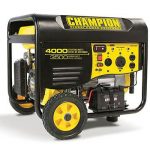
We're a team of professional travelers, on-the-go freelancers, web producers, writers and editors. Our mission is to pick the best travel gear by analyzing customer opinions and writing our own findings to help you find the right products for you. Please share our posts to help us grow. Read more...
